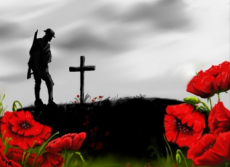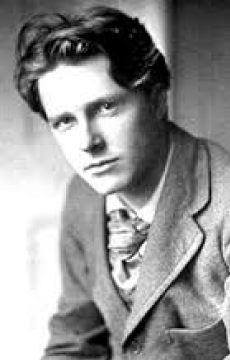
Email: ZYVC057@live.rhul.ac.uk
Total Article : 213
About Me:I'm a graduate student studying International Criminal Law and first started writing for King's News almost 4 years ago! My hobbies include reading, travelling and charity work. I cover many categories but my favourite articles to write are about mysteries of the ancient world, interesting places to visit, the Italian language and animals!

At a time in which the world was entering its first ever total war, many poets dedicated verses upon verses to voicing their take on the events and became true war poets. As momentum was building towards the beginning of World War One, Rupert Brooke wrote sonnets that idealised the prospect of a glorious war, representing patriotic sentiments embedded in a pre-war society. In Soldiers, which was published in newspapers shortly after it was written, Brooke directs his focus to idealising the soldier who achieves ultimate glory and prestige by fighting in the name of Britain, fulfilling his honourable duty in the most heroic of ways.
The soldier
If I should die, think only this of me:
That there's some corner of a foreign field
That is forever England. There shall be
In that rich earth a richer dust concealed;
A dust whom England bore, shaped, made aware,
Gave, once, her flowers to love, her ways to roam,
A body of England's, breathing English air,
Washed by the rivers, blest by the suns of home.
And think, this heart, all evil shed away,
A pulse in the eternal mind, no less
Gives somewhere back the thoughts by England given;
Her sights and sounds; dreams happy as her day;
And laughter, learnt of friends; and gentleness,
In hearts at peace, under an English heaven.
Analysis:
Before analysing the poem it is important to note that although Brooke wrote many poems on wars and inciting them, he only joined the Royal Navel Volunteer Reserve at the age of 27. The following year, in 1915, he sailed with the British Mediterranean Expeditionary Force and developed a sepsis* caused by a mosquito bike and died soon after. He never actually fought in combat and many critics see this as the reason he wrote so positively about wars, he had never witnessed the true horrors a war could bring.

The Soldier is a sonnet that incites men to go to war. Brooke begins by addressing the reader directly and speaks to them in an imperative ‘think this only of me’. He continues to say that if he were to die in combat the reader should not mourn as it would be for the sacrifice of a greater cause, the freedom of his country. In the first half of the poem Brooke believes that even if an English soldier were to die in a foreign country he would be giving to England. In this poem Brooke sees England as almost a motherly figure and his love and willingness to fight for his country can be compared to the undying love a son has for his mother; the second half of the poem in fact calls upon typically English characteristics such as the sights, dreams, laughter, sounds and friends that England has gifted him with. Towards the end of the poem Brooke forgets the foreign country in which he may die and think of how he would be transformed into an eternal spirit, implying in the last line that he may even be part of an English heaven. The poem cleverly envisions death as a sacrifice but also a form of salvation as it’s the chance to serve for such a magnificent country and to protect it against all. The recurrent feature in each stanza is the praise given to England and the courage and bravery associated with the English soldier. Never does the poet evoke negative images of war, the fighting and the pain of death, the image of England is overwhelmingly glorious that it is all that matters.
The sonnet is based on two influential types of sonnet: the Petrarchan or Italian sonnet in regards to the structure (14 lines divided into 2 parts) of the poem and the Shakespearean or English sonnet due to the rhyming scheme (a-b-a-b, c-d-c-d, e-f-e-f etc.), an important classical mixture of sonnets for an almost regally worded poem of glorification.
*infection of entire body inflammation
Image 1: http://s1.hubimg.com/u/5685148_f520.jpg
Image 2 (Rupert Brooke): http://www.anglik.net/WW1RupertBrooke.gif

0 Comment:
Be the first one to comment on this article.